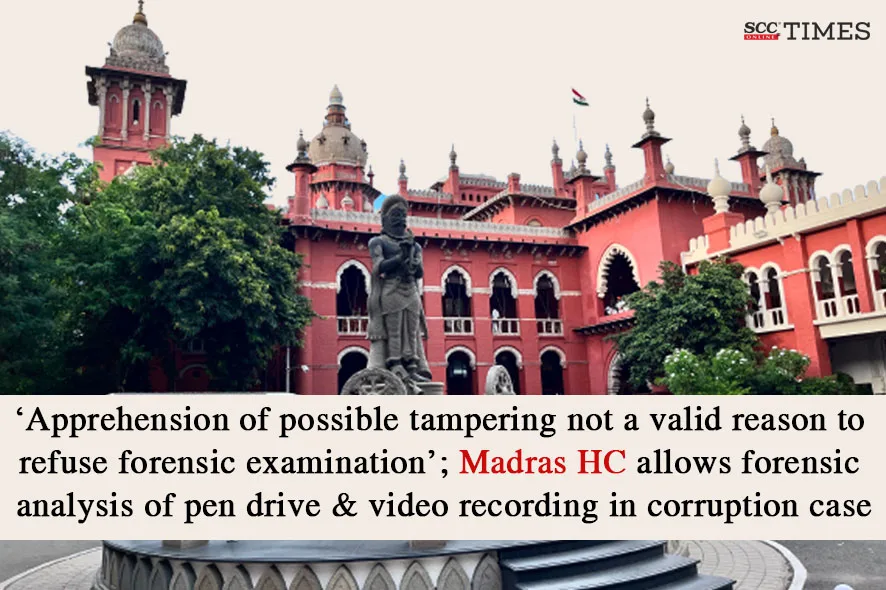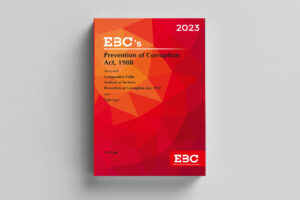Madras High Court: In a criminal revision petition filed under Section 442 of the Bharatiya Nagarik Suraksha Sanhita, 2023, seeking to quash the order of the Special Court / Chief Judicial Magistrate, which had dismissed the accused’s application for forensic examination of certain audio and video recordings and for securing the voice sample of the complainant, a Single Judge Bench of B. Pugalendhi, J. emphasised that the accused was entitled to a fair opportunity to rebut the allegations made against him. The Court observed that denying access to forensic comparison, despite the presence of specific electronic material forming part of the defence evidence, amounted to a serious curtailment of the accused’s right to a fair trial.
For the foregoing reasons, the Court held that the order passed by the Chief Judicial Magistrate-cum-Special Judge suffered from a non-application of mind with respect to the legal principles governing expert evidence and the right to a fair trial and thus warranted interference.
Accordingly, the Criminal Revision Petition was allowed, and the impugned order was set aside.
The Court directed the Trial Court to:
- Permit the forensic examination of the pen drive and the video recording by a competent Government Forensic Laboratory, while prescribing a reasonable outer time limit;
- Take necessary steps to secure the voice sample of the complainant under due process, solely for the purpose of expert comparison;
-
Proceed with the trial expeditiously, considering that the case pertains to the year 2020, and dispose of it in accordance with law.
Background
The accused, who had served as the Electrical Inspector, Tirunelveli District, was facing trial under Section 7(a) of the Prevention of Corruption Act, 1988. It was alleged that he had demanded and accepted an illegal gratification of Rs. 8,000 from the complainant, an Electrical Contractor, in exchange for issuing a safety certificate for a 20 KVA generator. He was arrested on 23-11-2018, following a trap laid by the Vigilance and Anti-Corruption Wing. The trial was at the stage of examination of defence witnesses.
The accused submitted that a pen drive marked during defence evidence, contained three audio recordings of conversations between him and the complainant, including one recorded on the date of the trap. It was argued that the tone and context of the recordings contradicted the prosecution’s version and supported the defence case. He contended that the authenticity and integrity of these recordings required forensic verification under Section 45A of the Evidence Act, 1872 for which obtaining the voice sample of the complainant was necessary.
It was submitted that the Trial Court had erred in summarily dismissing the application. The accused contended that the mere possibility of tampering could not substitute the necessity for expert analysis, which is specifically intended to determine such issues. Denial of this opportunity, it was argued, violated his right to present an effective defence and was contrary to the principles of a fair trial. Accordingly, the accused prayed for appropriate relief.
Analysis and Decision
The Court observed that the impugned order of the Trial Court disclosed that the accused’s application had been dismissed on three principal grounds:
(a) the video recording was made four years after the registration of the FIR;
(b) the individuals appearing in the recording had not been examined; and
(c) the possibility of tampering rendered the recordings suspect.
However, the Court held that it was unable to accept the reasoning of the Trial Court in its entirety. It noted that the delay in recording the video did not, by itself, render it inadmissible or irrelevant. The Court reasoned that if the conversation captured in the video were to be proven authentic, it could substantiate the allegation of suppression of CCTV footage, which was a material issue with potential bearing on the credibility and integrity of the trap proceedings.
The Court further said that, as regards the voice recordings, their proximity to the alleged incident, including a conversation recorded on the very day of the trap made them intrinsically relevant. It stated that whether these recordings supported or rebutted the prosecution’s allegations was a matter to be determined during trial. However, they could not be excluded from scientific scrutiny merely on speculative grounds.
The Court also opined that the apprehension of possible tampering or alteration of the recordings did not constitute valid justification for refusing forensic examination. On the contrary, such concerns strengthened the case for expert analysis. It emphasised that any determination regarding whether the files were edited or manipulated could only be made by a competent forensic authority, and not through assumptions or oral statements made by lay witnesses.
With regard to the power to direct a person to provide voice samples, the Court referred to the legal position laid down in Ritesh Sinha v. State of U.P., (2019) 8 SCC 1, wherein it was held that, until explicit provisions were incorporated into the Criminal Procedure Code by Parliament, a Judicial Magistrate must be deemed to have the authority to order a person to give a voice sample for the purpose of investigation. It was observed that such power could be conferred upon a Magistrate through judicial interpretation and exercised under the jurisdiction vested in the Court by Article 142 of the Constitution of India.
The Court noted that the recently enacted Section 349 of the Bharatiya Nagarik Suraksha Sanhita, 2023, reflects a statutory recognition of this principle, thereby reinforcing the legal basis for directing the collection of voice samples in aid of criminal investigations.
On the issue of whether a judicial order compelling the provision of voice samples would violate the fundamental right to privacy under Article 20(3) of the Constitution, the Court held that such a contention was untenable. It observed that the right to privacy, like all fundamental rights, is not absolute and may be reasonably restricted when a larger public interest is involved.
The Court, therefore, held that the refusal to summon the voice sample of the complainant particularly when it constituted the only means to facilitate a scientific comparison, could not be justified merely on the grounds of privacy,especially where the sample was sought under judicial supervision and strictly for the limited purpose of expert analysis in the context of a pending criminal trial.
The Court emphasised that the accused was entitled to a fair opportunity to rebut the allegations made against him. It observed that denying access to forensic comparison, despite the presence of specific electronic material forming part of the defence evidence, amounted to a serious curtailment of the accused’s right to a fair trial.
For the foregoing reasons, the Court held that the order passed by the Chief Judicial Magistrate-cum-Special Judge suffered from a non-application of mind with respect to the legal principles governing expert evidence and the right to a fair trial and thus warranted interference.
Accordingly, the Criminal Revision Petition was allowed, and the impugned order was set aside.
[C.J.Christopher Signi v. State of Tamil Nadu, 2025 SCC OnLine Mad 3214, decided on 09-07-2025]
Advocates who appeared in this case:
For Petitioner : Mr.V.R.Shanmuganathan
For Respondents: Mr.A.S.Abul Kalam Azad , Government Advocate (Crl. Side)




